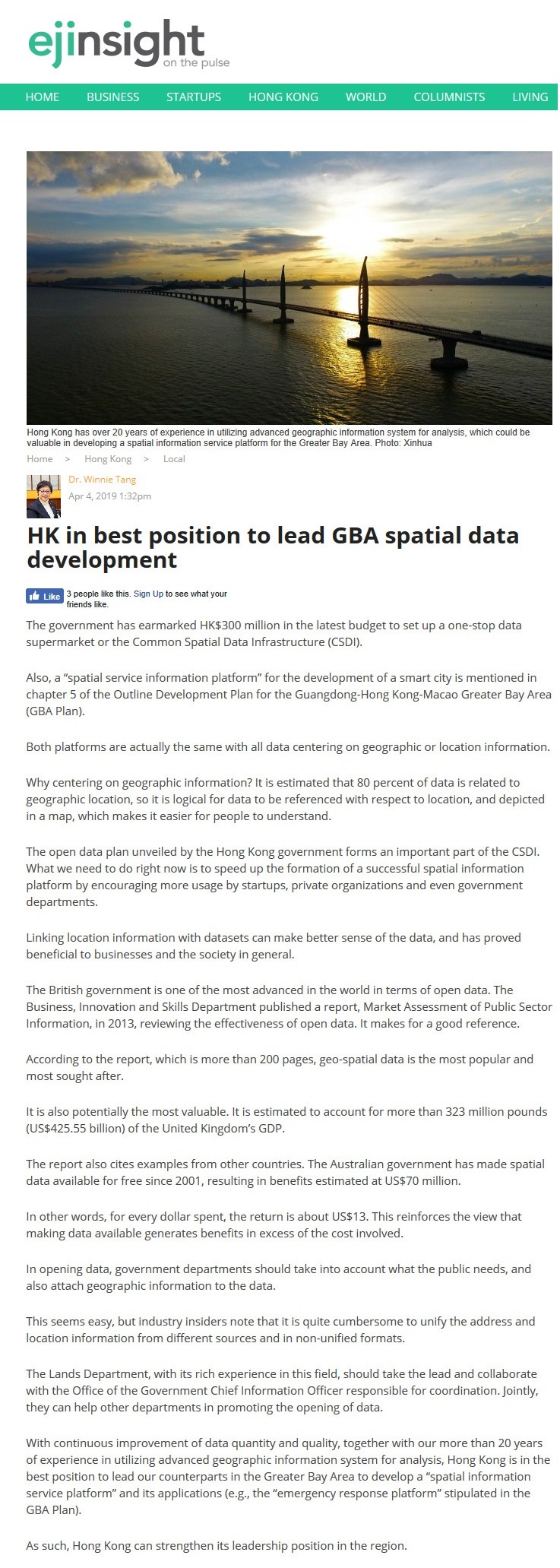上版請按此

HK in best position to lead GBA spatial data development
The government has earmarked HK$300 million in the latest budget to set up a one-stop data supermarket or the Common Spatial Data Infrastructure (CSDI).
Also, a "spatial service information platform" for the development of a smart city is mentioned in chapter 5 of the Outline Development Plan for the Guangdong-Hong Kong-Macao Greater Bay Area (GBA Plan).
Both platforms are actually the same with all data centering on geographic or location information.
Why centering on geographic information? It is estimated that 80 percent of data is related to geographic location, so it is logical for data to be referenced with respect to location, and depicted in a map, which makes it easier for people to understand.
The open data plan unveiled by the Hong Kong government forms an important part of the CSDI. What we need to do right now is to speed up the formation of a successful spatial information platform by encouraging more usage by startups, private organizations and even government departments.
Linking location information with datasets can make better sense of the data, and has proved beneficial to businesses and the society in general.
The British government is one of the most advanced in the world in terms of open data. The Business, Innovation and Skills Department published a report, Market Assessment of Public Sector Information, in 2013, reviewing the effectiveness of open data. It makes for a good reference.
According to the report, which is more than 200 pages, geo-spatial data is the most popular and most sought after.
It is also potentially the most valuable. It is estimated to account for more than 323 million pounds (US$425.55 billion) of the United Kingdom's GDP.
The report also cites examples from other countries. The Australian government has made spatial data available for free since 2001, resulting in benefits estimated at US$70 million.
In other words, for every dollar spent, the return is about US$13. This reinforces the view that making data available generates benefits in excess of the cost involved.
In opening data, government departments should take into account what the public needs, and also attach geographic information to the data.
This seems easy, but industry insiders note that it is quite cumbersome to unify the address and location information from different sources and in non-unified formats.
The Lands Department, with its rich experience in this field, should take the lead and collaborate with the Office of the Government Chief Information Officer responsible for coordination. Jointly, they can help other departments in promoting the opening of data.
With continuous improvement of data quantity and quality, together with our more than 20 years of experience in utilizing advanced geographic information system for analysis, Hong Kong is in the best position to lead our counterparts in the Greater Bay Area to develop a "spatial information service platform" and its applications (e.g., the "emergency response platform" stipulated in the GBA Plan).
As such, Hong Kong can strengthen its leadership position in the region.
Dr. Winnie Tang
Adjunct Professor, Department of Computer Science, Faculty of Engineering and Faculty of Architecture, The University of Hong Kong